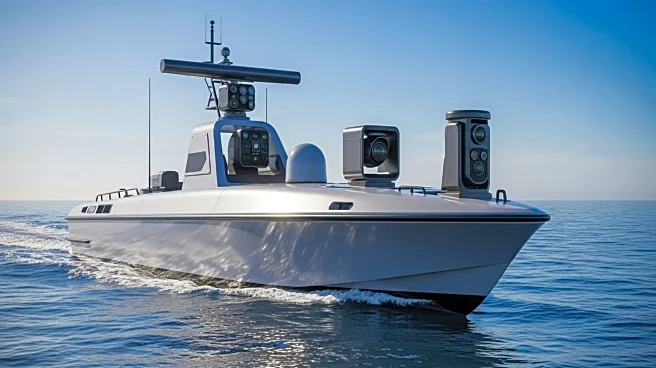What is the story about?
What's Happening?
Unmanned Surface Vessels (USVs) are increasingly transforming the maritime industry, offering advantages in efficiency, cost reduction, and human safety. However, their remote operation at high speeds presents unique challenges that traditional maritime safety approaches struggle to address. Hefring Marine's Intelligent Marine Assistance System (IMAS) technology is designed to mitigate these risks by enhancing USV operations. The technology provides dynamic speed management and real-time risk assessment, addressing the critical safety gap created by high-speed operations. Recent incidents, such as the capsizing of a support towboat during a Navy-operated USV exercise, highlight the need for improved safety measures. IMAS technology aims to bridge the awareness gap for remote operators, ensuring safer high-speed operations.
Why It's Important?
The integration of IMAS technology into USV operations is crucial for the maritime industry as it seeks to expand the use of these vessels. By providing a comprehensive safety layer, IMAS helps operators manage the risks associated with high-speed remote operations, which are becoming more prevalent. This technology not only supports regulatory compliance but also enhances public trust in USV operations. As maritime authorities develop new regulations, advanced safety systems like IMAS will be essential for meeting compliance requirements and enabling USVs to reach their full potential. The ability to safely capitalize on the speed and efficiency of USVs is vital for their application in various maritime sectors, including defense, environmental monitoring, and offshore surveying.
What's Next?
As the maritime industry continues to adopt USVs, the demand for advanced safety systems like IMAS is expected to grow. Maritime authorities are likely to implement stricter regulations for USV operations, making technologies that enhance safety and compliance increasingly important. Operators may need to invest in systems like IMAS to ensure their vessels meet emerging standards and can operate safely at high speeds. The development of new regulations and the integration of safety technologies will play a significant role in shaping the future of USV operations, potentially leading to broader adoption and innovation in the industry.
Beyond the Headlines
The adoption of IMAS technology in USV operations could have broader implications for the maritime industry, including ethical considerations related to remote vessel operation and the potential for increased automation. As USVs become more prevalent, there may be discussions about the balance between human oversight and automated systems, particularly in high-risk scenarios. The technology also raises questions about data privacy and security, as real-time risk assessments rely on extensive data collection and analysis. These considerations will be important as the industry navigates the integration of advanced technologies into maritime operations.















